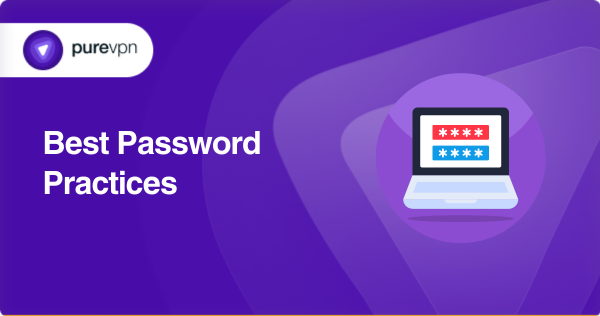Table of Contents
Your personal or business’s sensitive information is like a treasure chest, and the password is the lock keeping it safe. But don’t underestimate the cunning of hackers and their ability to pick that lock with ease. Even an 11-digit numeric password is no match for their digital sleight of hand.
It’s crucial to stay on your tips and keep up with cyber criminals constantly upping their game. Questions like “When should I change my password?” or “Can I use ‘password123’ as my password?” are more important than ever in today’s fluid online landscape.
This article will highlight the importance of passwords and ways to keep your data safe on this World Password Day.

What is World Password Day?
World Password Day is celebrated on the first Thursday in May each year to raise awareness about the importance of good password security.
It started with Mark Burnett’s “password day” idea from his 2005 book Perfect Passwords, which inspired Intel Security to designate a day for Password Security in 2013.
Since that day, the day has been observed annually and is crucial for safeguarding important data and information.
What is Password Security?
Password security refers to the measures and protocols put in place to protect your online accounts and personal information from unauthorized access by cybercriminals. It’s a crucial aspect of cybersecurity, as passwords act as first in line against hackers looking to steal your identity, financial data, and other sensitive information.
What is the importance of Password Security?
If you think that just keeping a unique password will keep them secure, then you will be surprised to know that research shows that 21 million unique passwords were hacked in 2019 alone.
If you use weak, easy-to-guess passwords or recycle the same one repeatedly, you or your business are like a sitting duck waiting to be breached. And the consequences can be disastrous, from identity theft and data breaches to blackmail and ransomware.
This is why password protection is so important because, with poor password security, you can suffer great financial or personal loss.
So don’t neglect password security – it’s a crucial piece of the cybersecurity puzzle.
From Hacking to Hijacking: Unpack the Top Password Security Threats
In today’s digital landscape, password security is more critical than ever, with cybercriminals continually devising new and innovative ways to bypass password protections. Some of the most common threats that you should be aware of are:
- Password cracking or Brute-force attack
Password cracking is a prevalent attack method hackers use to access private information. Weak passwords, such as those that are easy to guess or commonly used, can make it even easier for cybercriminals to break through your defenses.
- Hook, line, and sinker: The phishing attacks
Phishing attacks are designed to deceive you into revealing your passwords and other sensitive information by posing as legitimate communications from trustworthy sources. These attacks can be challenging to spot, making it critical to remain vigilant and practice good password hygiene.
- Dictionary attack
A dictionary attack is a method hackers use to defeat authentication mechanisms such as passwords. They generate hundreds of millions of potential password combinations based on a pre-established list of words or a dictionary.
- Keylogging attacks
Keylogging involves the installation of malware on your device that records every keystroke you make, allowing cybercriminals to capture your usernames and passwords. This tactic can be challenging to detect, making it important to use strong passwords and keep your technology support updated.
- Password guessing
Password guessing is like using a key to open many doors, except the key is a list of frequently used passwords, and the doors are your accounts. Hackers try their luck by guessing these passwords against their victim’s username, hoping that they’ve used a common word or phrase as their password.
- Social engineering tactic
Hackers use this technique to manipulate people into giving up their private information or access to systems. It’s like a con artist tricking you into giving them money, but instead of money, they want your passwords or access to your computer.
Social engineering often involves calling or talking to the victim in person and pretending to be someone they trust, like a bank or a colleague. Sometimes, the hacker simply asks for the victim’s password, which, surprisingly, often works.
- Database breach
This serious cyber threat involves unauthorized access to a database by exploiting vulnerabilities in software and systems. This attack can result in the loss of sensitive information such as personal data, credit card information, and other sensitive data.
Hackers can use various techniques to hack databases, including SQL injection attacks, social engineering, and exploiting network security flaws. Once they gain access, they can steal or modify information and cause damage to the reputation of the affected organization.
- Network sniffing attack
A network sniffing attack is like eavesdropping on a conversation. Hackers can use readily available tools to monitor the traffic on a network and intercept your usernames and passwords as they are being transmitted.
This technique works on unencrypted connections, which means that any information transmitted over the network can be easily captured and stolen. It’s a sneaky way for hackers to access your sensitive data without your knowledge or consent.
Essential Do’s and Don’t for Password Security
Creating and managing strong passwords is essential to safeguarding your online accounts and sensitive data from unauthorized access. Here are some do’s and don’ts for password protection:
Do’s:
- Use a unique password for each account: It is better to avoid using the same password for many accounts, as this can increase the risk of a cyber invasion. If one password is compromised, all your accounts will be at risk.
- Mix and Match: Use a strong password comprising upper and lowercase letters, numbers, and symbols. Avoid using easily guessable information such as birthdays, names, or common words.
- Use a password manager: Using a Password manager like PureKeep is a great way to keep track of all your passwords securely. They generate and store strong passwords, making using unique passwords for each account easier.
- Enable two-factor authentication: Two-factor authentication adds an extra cushion to the security of your accounts. To access your account, you must provide an additional verification form, such as a code sent to your phone.
- Evaluate your password’s strength: After creating a password, it’s crucial to assess its strength. To do so, utilize a password strength checker to evaluate your password’s robustness and indicate how long it would take to crack. This step will ensure your password is strong enough to safeguard your accounts from unauthorized access.
Don’ts:
- Don’t share your passwords: Never share your passwords with anyone, even friends or family members. You can never be sure who might misuse your sensitive information.
- Don’t use personal information: Avoid using personal information such as your name, address, or phone number as your password. Cybercriminals can easily guess this information and gain access to your accounts.
- Don’t write down your passwords: Writing down your passwords can be risky, as the paper can be lost or stolen. If you must write down your passwords, keep them in a secure location.
- Don’t reuse old passwords: Reusing old passwords is a sure way to get hacked, as they may have been compromised in a previous data breach. Always use a new, strong password for each account.
- Don’t use a short password: When creating passwords, it’s crucial to avoid creating ones too short. Although they may appear easier to remember, this isn’t always true. Also, these passwords are more vulnerable to password-cracking programs that can quickly decipher them.
- Don’t save passwords in your browser: Never save your passwords in your browser unless the browser is highly secure. And if your web browser is storing your login credentials, it’s crucial to take the necessary measures to secure your browser. By doing so, you can prevent unauthorized access to your accounts and avoid becoming a victim of cybercrime.
Tips to Ensure Data Security
Visit secure websites only
Always check for the “https://” prefix in the website’s address bar to avoid cyber threats like eavesdropping. This indicates that the site utilizes Transport Layer Security (TLS), which encrypts all communications between your browser and the website.
By exclusively visiting secure websites, you can protect your sensitive information, including login credentials and credit card details, from malicious attackers.
Keep your software Up-to-Date
Don’t let hackers exploit your software’s vulnerabilities. Make sure to install updates regularly, as they offer new features and fix security flaws. If you’re too busy, automate the update process to keep your devices secure effortlessly.
Remember, a missed update could be an open invitation for cybercriminals to wreak havoc on your system.
Invest in top-notch security tools
Investing in a power-packed security tool like PureSquare can provide an added layer of protection to keep you safe online. The comprehensive suite includes
- PureVPN: Keeps you anonymous and hides your IP address.
- PurePrivacy: Scans for at-risk data and safeguards your privacy.
- PureEncrypt: Prevents data breaches and secures your files.
- PureKeep: Offers a safe vault to manage and store all your passwords.
Final thoughts
In conclusion, following password best practices is essential to keeping your online accounts and personal information safe from cybercriminals. Using strong and unique passwords, avoiding common mistakes like using personal information or simple patterns, and regularly updating passwords can significantly reduce the risk of a password-related security breach.
So let’s celebrate this World Password Day by adopting these do’s and avoiding the don’ts of password protection for a secure and risk-free online experience!
Frequently Asked Questions
The four main rules for creating strong passwords are:
– Length: At Least 12 characters long.
– Complexity: Mix and match letters, numbers, and characters.
– Unpredictability: Avoid using common words or consecutive numbers.
– Unique: A different password for each of your accounts.
Here are three examples of bad passwords:
– 123456 – This is one of the most commonly used passwords and is easy to guess.
– Password – Using “password” as your password is like leaving your front door unlocked.
– Your name or date of birth – Personal information is easily guessed or obtained and should never be used as a password.
To create a strong password, randomness, and length play a vital role. A good practice is having a minimum password length of 12 characters or 14 or more.
Here are some examples of strong passwords:
– P@$$w0rdStr0ng
– C0rr3ctH0rseB@tterySt@ple
– Tr0ub4dor&3
– 9&gHtT#6$k@L
– Fr3shAv0cad0S@l@d
BetterBuys states that a password of eight characters can be cracked in 5 hours, and a nine-character password can be cracked in 5 days. For a password with 10 characters, it can take up to 4 months to be cracked; for 11 characters, the time extends to 10 years. However, by using a password length of 12 characters would take a whopping 200 years to break it!



